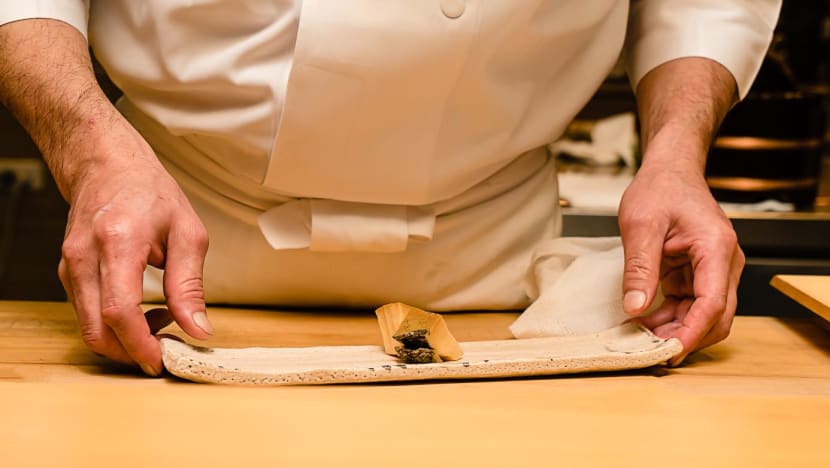Commentary: Japan's 'no first-time customers' reservation policy may help some restaurants
The Japanese practice of “no first-time customers” might be a promising business model for some restaurants, says Bloomberg Opinion's Howard Chua-Eoan.

File photo. In Japan, some of the restaurants that practice ichigensan okotowari have been handed down through generations of chefs. (Photo: iStock/Kajornsiri Auimanachai)
LONDON: If you could hear handwringing, that was the noise that sounded around the world as people scrolled through The New Yorker’s piece on the cutthroat secondary market for bookings in Manhattan’s hottest restaurants.
Adam Iscoe went through the many ways diners can get to eat at some of the toughest tables in town - almost all involved spending large amounts of money, sometimes just for the right to get in the front door. Think Ray Liotta at the Copacabana in Goodfellas, but handing off a lot more cash.
Still, it could be worse. I’m reminded of a cartoon caption - most likely from the same magazine - that portrayed someone on the phone negotiating a reservation with a would-be customer, saying, “Never. How about never?”
I’m thinking of the reservation system followed by some high-end establishments in Japan: Ichigensan okotowari or, no first-time customers.
These are probably the best restaurants you’ve never (or will never) hear of because they only let in regulars and their guests. These guests can become regulars if they pass muster. They are then allowed to book seats under their own names.
If you want to go but don’t have a member of the restaurant’s faithful to vouch for or accompany you, you’re out of luck. It’s the kind of exclusivity that’s truly meant to exclude. And while it may not be the most democratic of business models, it may be a beneficial one in terms of sustainability and culinary integrity.
"YOUR MEAL IS OVER"
For chefs and restaurateurs, getting customers into the seats is one thing; attracting people who actually appreciate what you do is another. That point was made by a story about the great New York chef David Bouley that circulated after he died in February.
As the tale went, Bouley - whose eponymous restaurants were central to Manhattan’s epicurean renaissance in the 1980s and 1990s - had just received a fresh supply of Copper River salmon of exquisite quality. He put it on the menu that evening and sent it out as a first course - tenderly baked and accompanied by creamy watercress rice and a puree of peas.
But to his surprise (and his staff, as well, who had been oohing and aahing over the fish), the couple they served with the dish sent it back, complaining it was fishy and could they have the shrimp instead.
The chef was furious. He tore up the order ticket for the couple’s table and commanded the flustered maitre d’ to tell them "their meal is over". The kitchen erupted in applause. And the mystified (though apparently “surly”) couple scampered out, never to darken the portals of a Bouley restaurant ever again. Or so I assume.
I remember arriving at a favourite restaurant of mine too late to get the last order of a terrific pork chop. It went to the customer seated next to me at the bar. He was very carefully cutting away all the fat and only ate the lean meat. I was exasperated: The whole point of the dish was its unctuousness; the pig was raised for its fat.
I wasn’t the only person outraged. The server who took away the not-quite-empty plate came back with a message from the kitchen: “Sir, the chef noticed that you didn’t finish your food. Was everything ok?” The diner was nonplussed and mumbled something. It was the restaurant’s polite way of putting him on notice: Never do that again.
REGULARS ONLY
A restaurant owner I know in Copenhagen says that he’d like nothing better than to have tried-and-true regulars as their customer base. That’s not really acceptable for restaurants indoctrinated in the Western ideal of perpetual growth and the magic escalator of scalability. But it may just work for cooks and purveyors of hospitality who want to retain the quality of their craft by remaining small and off-the-radar.
In Japan, some of the restaurants that practice ichigensan okotowari have been handed down through generations of chefs. But then they very rarely have to jump through the hoops that almost all Western-style restaurants do: Worrying about the latest food trends; or preparing substitutes to their non-vegan or non-vegetarian specialties. If you don’t like what the restaurant is good at, the cognoscenti won’t take you there.
The practice is certainly not universal even in Japan - and there are more popular and accessible spots that will give you alternatives to shellfish and skewered poultry. But in high-end restaurants that do take call-in or online reservations, first dibs still often go to the regulars - and their friends (and would-be future regulars). At the end of a meal, most of the customers book their next.
I had the great good fortune to get into Sugita, one of the best sushi-yas in Tokyo today, through a friend who is a regular there. It wasn’t an inexpensive meal but I paid much less than the amounts that diners in New York are willing to throw at the apps and sites that offer entry to the trendiest dining rooms in town. I had one of the most memorable meals of my life at Sugita. My only regret: I wasn’t asked about a reservation for my next visit.

















